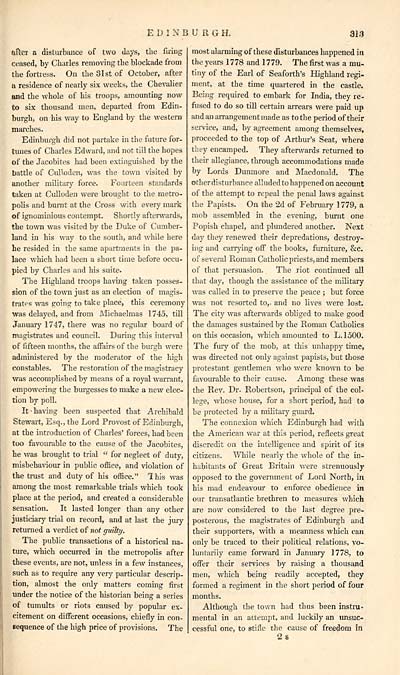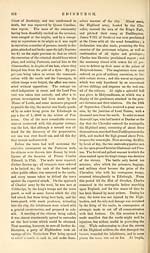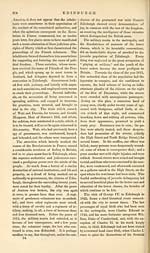Gazetteer of Scotland > Volume 1
(347) Page 313 - EDI
Download files
Complete book:
Individual page:
Thumbnail gallery: Grid view | List view

EDINBURGH.
313
after a disturbance of two days, the firing
ceased, by Charles removing the blockade from
the fortress. On the 31st of October, after
a residence of nearly six weeks, the Chevalier
and the whole of his troops, amounting now
to six thousand men, departed from Edin-
burgh, on his way to England by the western
marches.
Edinburgh did not partake in die future for-
tunes of Charles Edward, and not till the hopes
of the Jacobites had been extinguished by the
battle of Culloden, was the town visited by
another military force. Fourteen standards
taken at Culloden were brought to the metro-
polis and burnt at the Cross with every mark
of ignominious contempt. Shortly afterwards,
the town was visited by the Duke of Cumber-
land in his way to the south, and while here
he resided in the same apartments in the pa-
lace which had been a short time before occu-
pied by Charles and his suite.
The Highland troops having taken posses-
sion of the town just as an election of magis-
trates was going to take place, this ceremony
was delayed, and from Michaelmas 1745, till
January 1747, there was no regular board of
magistrates and council. During this interval
of fifteen months, the affairs of the burgh were
administered by the moderator of the high
constables. The restoration of the magistracy
was accomplished by means of a royal warrant,
empowering the burgesses to make a new elec-
tion by poll.
It 'having been suspected that Archibald
Stewart, Esq., the Lord Provost of Edinburgh,
at the introduction of Charles' forces, had been
too favourable to the cause of the Jacobites,
he was brought to trial " for neglect of duty,
misbehaviour in public office, and violation of
the trust and duty of his office." This was
among the most remarkable trials which took
place at the period, and created a considerable
sensation. It lasted longer than any other
justiciary trial on record, and at last the jury
returned a verdict of not guilty.
The public transactions of a historical na-
ture, which occurred in the metropolis after
these events, are not, unless in a few instances,
such as to require any very particular descrip-
tion, almost the only matters coming first
under the notice of the historian being a series
of tumults or riots caused by popular ex-
citement on different occasions, chiefly in con-
sequence of the high price of provisions. The
most alarming of these disturbances happened in
the years 1778 and 1 779. The first was a mu-
tiny of the Earl of Seaforth's Highland regi-
ment, at the time quartered in the castle.
Being required to embark for India, they re-
fused to do so till certain arrears were paid up
and an arrangement made as to the period of their
service, and, by agreement among themselves,
proceeded to the top of Arthur's Seat, where
they encamped. They afterwards returned to
their allegiance, through accommodations made
by Lords Dunmore and Macdonald. The
other disturbance alluded to happened on account
of the attempt to repeal the penal laws against
the Papists. On the 2d of February 1779, a
mob assembled in the evening, burnt one
Popish chapel, and plundered another. Next
day they renewed their depredations, destroy-
ing and carrying off the books, furniture, &c.
of several Roman Catholic priests, and members
of that persuasion. The riot continued all
that day, though the assistance of the military
was called in to preserve the peace ; but force
was not resorted to,, and no lives were lost.
The city was afterwards obliged to make good
the damages sustained by the Roman Catholics
on this occasion, which amounted to L.1500.
The fury of the mob, at this unhappy time,
was directed not only against papists, but those
protestant gentlemen who were known to be
favourable to their cause. Among these was
the Rev, Dr. Robertson, principal of the col-
lege, whose house, for a short period, had to
be protected by a military guard.
The connexion which Edinburgh had with
the American war at this period, reflects great
discredit on the intelligence and spirit of its
citizens. While nearly the whole of the in-
habitants of Great Britain were strenuously
opposed to the government of Lord North, in
his mad endeavour to enforce obedience in
our transatlantic brethren to measures which
are now considered to the last degree pre-
posterous, the magistrates of Edinburgh and
their supporters, with a meanness which can
only be traced to their political relations, vo-
luntarily came forward in January 1778, to
offer their services by raising a thousand
men, which being readily accepted, they
formed a regiment in the short period of four
months.
Although the town had thus been instru-
mental in an attempt, and luckily an unsuc-
cessful one, to stifle the cause of freedom in
2s
313
after a disturbance of two days, the firing
ceased, by Charles removing the blockade from
the fortress. On the 31st of October, after
a residence of nearly six weeks, the Chevalier
and the whole of his troops, amounting now
to six thousand men, departed from Edin-
burgh, on his way to England by the western
marches.
Edinburgh did not partake in die future for-
tunes of Charles Edward, and not till the hopes
of the Jacobites had been extinguished by the
battle of Culloden, was the town visited by
another military force. Fourteen standards
taken at Culloden were brought to the metro-
polis and burnt at the Cross with every mark
of ignominious contempt. Shortly afterwards,
the town was visited by the Duke of Cumber-
land in his way to the south, and while here
he resided in the same apartments in the pa-
lace which had been a short time before occu-
pied by Charles and his suite.
The Highland troops having taken posses-
sion of the town just as an election of magis-
trates was going to take place, this ceremony
was delayed, and from Michaelmas 1745, till
January 1747, there was no regular board of
magistrates and council. During this interval
of fifteen months, the affairs of the burgh were
administered by the moderator of the high
constables. The restoration of the magistracy
was accomplished by means of a royal warrant,
empowering the burgesses to make a new elec-
tion by poll.
It 'having been suspected that Archibald
Stewart, Esq., the Lord Provost of Edinburgh,
at the introduction of Charles' forces, had been
too favourable to the cause of the Jacobites,
he was brought to trial " for neglect of duty,
misbehaviour in public office, and violation of
the trust and duty of his office." This was
among the most remarkable trials which took
place at the period, and created a considerable
sensation. It lasted longer than any other
justiciary trial on record, and at last the jury
returned a verdict of not guilty.
The public transactions of a historical na-
ture, which occurred in the metropolis after
these events, are not, unless in a few instances,
such as to require any very particular descrip-
tion, almost the only matters coming first
under the notice of the historian being a series
of tumults or riots caused by popular ex-
citement on different occasions, chiefly in con-
sequence of the high price of provisions. The
most alarming of these disturbances happened in
the years 1778 and 1 779. The first was a mu-
tiny of the Earl of Seaforth's Highland regi-
ment, at the time quartered in the castle.
Being required to embark for India, they re-
fused to do so till certain arrears were paid up
and an arrangement made as to the period of their
service, and, by agreement among themselves,
proceeded to the top of Arthur's Seat, where
they encamped. They afterwards returned to
their allegiance, through accommodations made
by Lords Dunmore and Macdonald. The
other disturbance alluded to happened on account
of the attempt to repeal the penal laws against
the Papists. On the 2d of February 1779, a
mob assembled in the evening, burnt one
Popish chapel, and plundered another. Next
day they renewed their depredations, destroy-
ing and carrying off the books, furniture, &c.
of several Roman Catholic priests, and members
of that persuasion. The riot continued all
that day, though the assistance of the military
was called in to preserve the peace ; but force
was not resorted to,, and no lives were lost.
The city was afterwards obliged to make good
the damages sustained by the Roman Catholics
on this occasion, which amounted to L.1500.
The fury of the mob, at this unhappy time,
was directed not only against papists, but those
protestant gentlemen who were known to be
favourable to their cause. Among these was
the Rev, Dr. Robertson, principal of the col-
lege, whose house, for a short period, had to
be protected by a military guard.
The connexion which Edinburgh had with
the American war at this period, reflects great
discredit on the intelligence and spirit of its
citizens. While nearly the whole of the in-
habitants of Great Britain were strenuously
opposed to the government of Lord North, in
his mad endeavour to enforce obedience in
our transatlantic brethren to measures which
are now considered to the last degree pre-
posterous, the magistrates of Edinburgh and
their supporters, with a meanness which can
only be traced to their political relations, vo-
luntarily came forward in January 1778, to
offer their services by raising a thousand
men, which being readily accepted, they
formed a regiment in the short period of four
months.
Although the town had thus been instru-
mental in an attempt, and luckily an unsuc-
cessful one, to stifle the cause of freedom in
2s
Set display mode to: Large image | Transcription
Images and transcriptions on this page, including medium image downloads, may be used under the Creative Commons Attribution 4.0 International Licence unless otherwise stated. ![]()
| Gazetteers of Scotland, 1803-1901 > Gazetteer of Scotland > Volume 1 > (347) Page 313 - EDI |
|---|
| Permanent URL | https://digital.nls.uk/97428526 |
|---|
| Description | Volume I: Abbey to Glenartney. |
|---|---|
| Attribution and copyright: |
|
| Description | By Robert Chambers and William Chambers. Glasgow: Blackie & Son, 1838. 2 volumes. |
|---|---|
| Shelfmark | NF.1461.g.7 |
| Additional NLS resources: | |

